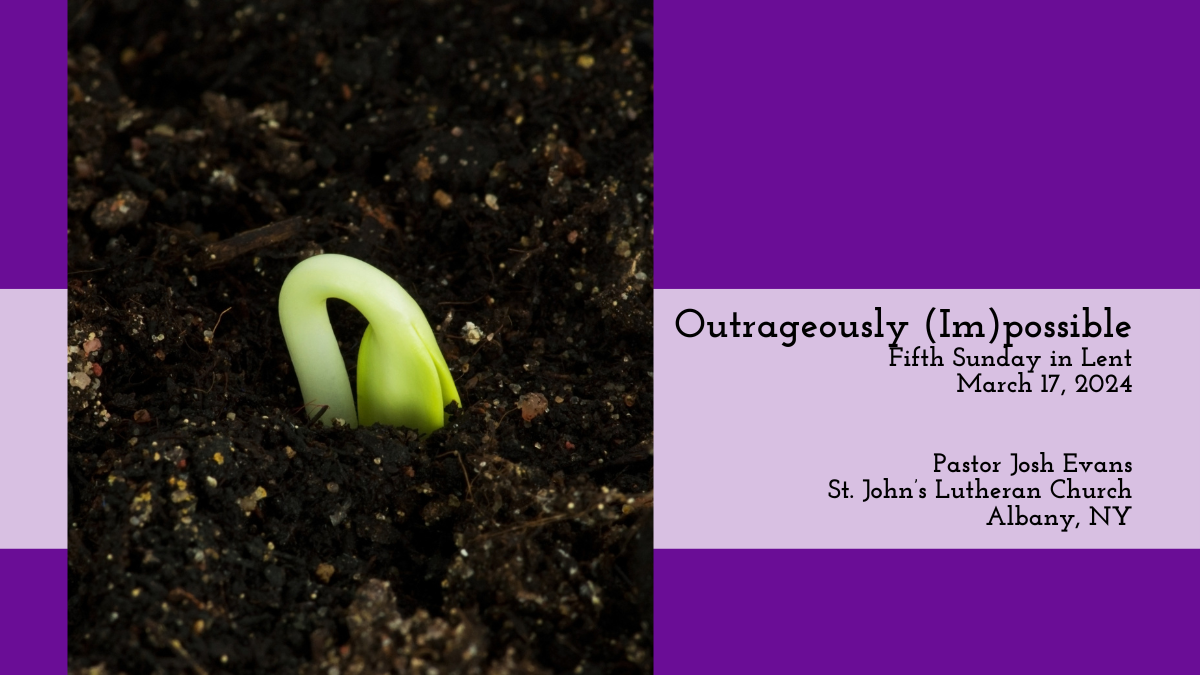St. John’s Lutheran Church
17 March 2024 + Lent 5b
Jeremiah 31:31-34; John 12:20-33
Rev. Josh Evans
It’s a changing and challenging world – shaped by bitter political rivalries, competing factions and parties vying for power, unrelenting wars and violence, displaced peoples fleeing persecution and oppression.
In the midst of it all, Jeremiah prophesies.
Jeremiah knows something of what it’s like to live during a time of tremendous political unrest and turmoil. Jeremiah, in fact, lived through five kingly regimes, during a time of drastic change and impending national exile in his country’s history.
In the midst of all this, Jeremiah prophesies on behalf of God to announce … the destruction of Judah … for turning away from the covenant between God and God’s people, at the heart of which is the command to love God and love neighbor.
This was a covenant that held justice-seeking neighbor-love at its divine center. This was a covenant that God’s people broke. Repeatedly.
***
We’ve been hearing a lot of covenant stories during these weeks of Lent – stories of God’s surprising faithfulness:
To Noah and his family, God promises to never again destroy the earth and its people in a great and mighty flood.
To Abraham and Sarah, God promises children, at long last, and to make them ancestors of a multitude of nations.
To the newly-freed Israelites, God offers the gift of the law, a means of ordering their lives around love and divine justice.
To the same Israelites, grumbling over “this miserable food” and succumbing to the bites of poisonous serpents in the wilderness, God, through Moses, raises up a bronze serpent on a pole so they might be healed and live.
And today: What outrageously impossible thing does God promise now? Something new.
God’s people know covenants, to be sure – covenants that God has made with them over and over again – covenants that they have broken over and over again.
But this covenant is new … different … unexpected. It is not at all like the covenants from before.
As a colleague put it earlier this week in an insightful blog post: “The new thing God promised [in Jeremiah] was that, though God’s people had broken every promise, violated every covenant, disappointed God in a million ways, God was not done with them.” (JoAnn Post)
This is an outrageously impossible covenant given to a people in exile, in the worst of the worst of situations, with no perceivable hope for the future.
Yet even there, a new covenant means that God has still not given up on being in relationship with God’s people.
Giving up, it seems, is simply not a part of God’s nature.
Indeed, God has still not given up on us. No matter how many times we fail, no matter how many times we think we’ve messed up beyond repair, no matter how many times we disappoint God and one another: God is not done with us.
Outrageous? Yes. But true.
***
Like a seed that falls into the earth and dies, this is a story of outrageously impossible resurrection.
Such is what God has always been about: new life for Noah and his family, new life for Sarah and Abraham and all their descendants, new life for the Israelites once freed from slavery and again promised a future beyond exile.
New life for God’s people, then and now.
What a marvelous metaphor – this seed imagery – for the outrageously impossible death and resurrection story of Jesus, to which our attention and liturgical life now turn, as we move into Holy Week.
What a marvelous metaphor for God’s outrageously impossible promises for us.
Life out of death. Hope out of despair. Resurrection even in the midst of so much evidence to the contrary. The abiding promise and presence of God, even in the midst of so much injustice, uncertainty, and brokenness.
It is outrageously impossible that God so persistently desires and chooses to remain in relationship with us.
“Seed that in earth is dying
grows into ears of grain,”
the hymn-writer prays,
“God, through this mystery grant us
faith in our deepest darkness,
life in our night and death.” (ELW 330)
God’s promises.
Outrageously possible.


